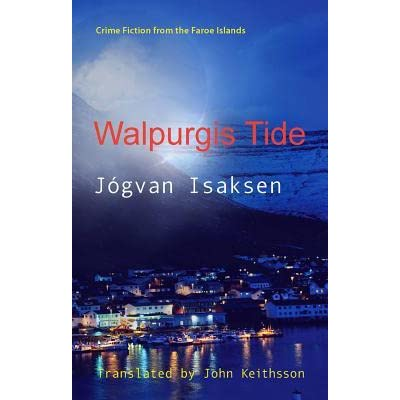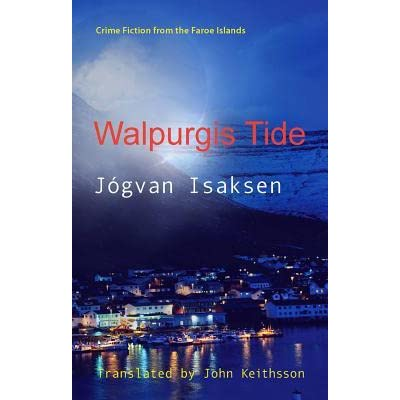Having decided I wanted to use Greenland for Desert rather than Polar Regions on my Wanderlust Bingo Card, and having already used Iceland, the US, and Canada for other squares, I went looking for literature from the Faroe Islands. (Their government has a whole report on the website called “The Faroe Islands – a nation in the Arctic”, so it definitely counts even though it isn’t listed on the “Arctic” Wikipedia page). I have wanted to visit the Faroes for a long time – remote and sparsely-populated islands always seem appealing to me, since all I really look for in a holiday destination is good food, good walks, and a comfy chair to read in – and I enjoyed the opportunity to virtually visit in Walpurgis Tide, a noir-ish novel by Jókvan Isaksen (translated by John Keithsson).
Walpurgis Tide is told from the perspective of Hannis Martinssen, a writer who has recently returned to capital city Tórshavn after a lengthy period as an expat in Denmark. After returning and setting up a “consultancy” (specifics not provided), he is approached by a man named Mark Robbins. Robbins is a British activist who works for an organisation called “Guardians of the Sea”, which is campaigning against the Faroes’ whale hunt. Two of their young activists have been brutally murdered during whaling season, their bodies dumped on the beach. Robbins does not want to go to the police, which he fears will bring his organisation into disrepute; instead, he wants someone who can conduct a discreet investigation into who is responsible, at which point it may become necessary to hand the evidence over to the police.
Unusually for a novel, there is an author’s note at the beginning of Walpurgis Tide that sets out his intentions for the book, ending with the following:
The dual intention of this book has from the beginning been to tell an exciting story, while at the same time detailing the Faroe Islands’ conflict with the outside world as regards the whale hunt. Whether or not I have succeeded in this is for the reader to decide.
Jókvan Isaksen, September 2015
Helpful, really, since it allows me to know on which precise criteria I am reviewing the success of this novel! Did Isaksen accomplish what he set out to do? Well, I think he managed about 50% of his goal. This is one of those books that is a strange combination of a boring story and a fascinating setting. I loved the window into a country and culture I know nothing about. It’s clear that, despite being written in Faroese originally, this was a story told with the expectation that outsiders would read it, because there are times where the action pretty much stops in order to explain something about the setting. This is generally done via Hannis remembering something about the Faroes that he’d forgotten during his time in Denmark. Sometimes the exposition is skilfully integrated, sometimes it’s clumsier, but at least it is a mechanism that makes sense. The scenery is described well, and since Hannis travels around during his investigation, we get glimpses of quite remote countryside as well as the busy city environment of Tórshavn – not to mention eventually accompanying him during a whale hunt.
The various pros and cons of the whaling debate are set out by different characters – though by having all the foreign characters opposed and all the locals in favour of the hunt, Isaksen perhaps doesn’t demonstrate as much nuance as he wanted to – and because it’s integrated into the premise of the plot, it didn’t feel too clumsy in terms of exposition. We hear about the cultural reasons that the hunt is important to people, the importance of having blubber and calorie-dense whale meat in a very cold climate with limited agriculture and farming, and the history of the hunt; we also hear via news reports and exposition the issues that the environmental organisations have with it (the brutal way the whales are killed, the fact that whale meat now has so much mercury in it that it’s unsafe to eat more than once a month, and the fact that the hunt kills an excessive number of whales for the population). Ironically, given his stated aim, Isaksen convinced me – a person who previously had no problem with whaling provided that it’s proportionate to the needs of a local population and not of an endangered species – that the specific hunt described is unnecessarily brutal and inhumane. I do think, though, that I got a good overview of both sides of the argument.
Unfortunately, it’s attached to a plot that is plodding and slow, told in a style – and who’s to say whether it’s Isaksen or his translator who’s to blame for this – heavily afflicted with what one of my English teachers used to call “and-then-itis”. It’s very noir-ish, with its bleak background material and misanthropic protagonist (plus a sprinkling of light misogyny for flavour), but the plot doesn’t really have the tension and suspense that I associate with the genre. Unfortunately, I think Isaksen missed the “tell an exciting story” part of his aim by a wide margin. I think it’s possible that he became so preoccupied with the arguments about whaling that he paid more attention to that than to the plot. Is it interesting that people were contesting whaling practices as early as the 1830s? Absolutely! Put it in a different kind of book, though. In his author’s note, Isaksen implies that he didn’t feel confident in his ability to write a nonfiction book about the topic. I rather wish he had – though I suppose I would never have picked it up.
Also, I did not find Hannis Martinssen credible as a human being. Fairly early in the novel, he is almost shot and killed by a lone gunman while in an isolated bit of countryside at night. The gunman is not caught at this point. Later on, he once again goes alone to an isolated spot in the countryside at night – despite having a friend who is a police officer! – and doesn’t even take his mobile. This is not plausible. I do not believe a human adult would behave with this little common sense. It is admittedly set around 2002, so while many people had mobiles they weren’t as ubiquitous as they are now. I could believe that he would forget it the first time, but not once he had been shot at. I found the whole idea of a writer being hired to investigate a murder difficult to swallow in the first place, and the way Hannis conducts the investigation did not in any way convince me otherwise. I’m willing to suspend a little disbelief about private individuals investigating a crime, since that’s often part of the premise of a crime novel, but in this case I really couldn’t see why Hannis was chosen over anyone else.
Despite all this, I probably enjoyed the novel more often than I didn’t. Why? The descriptions and exposition, really. Ultimately, I’m glad I read this. I would say I enjoyed plenty of things about it. Walpurgis Tide was an introduction to a country and culture I know nothing about, and I enjoyed the parallels with what I’ve previously read about Alaska and Greenland. I probably wouldn’t rush to pick up something else by the author, but if he had a different translator, I would give it a shot – I don’t know how much of the style was down to the writer and how much was lost in translation, after all. With a better prose style, a slow plot might become simmering tension, or a gradual build-up of dread. Not an out-and-out success, then, but not a failure either!


I had no idea the Faroes were in the Arctic – we’re all going to be geography experts soon! It sounds like the premise is more interesting than the end result, but I’m glad you found it more enjoyable than not. I also am reasonably easy about hunting whales or anything else so long as it’s done sustainably, but I must admit I’m too much of a wimp to read about it. I like my meat to come in plastic trays…
Yes, this is definitely a case of the premise not living up to its potential, which is a shame. I’m not bothered by reading about hunting, butchering etc, as long as it is for sustenance rather than fun and is not needlessly brutal, so I think it speaks volumes that I found the whale hunt in this book so difficult to read about!
This sounds like a unique premise and setting. It’s hard once you start to feel a character is implausible. I can never get quite into a novel the same way once a character starts acting in unlikely ways like that.
Yes, when a character is behaving in really unbelievable ways, it stops me from properly engrossing myself in a novel, because I’m constantly being reminded that it isn’t real. There was enough here to keep me engaged, though, with the interesting setting and concept!
I laugh-snorted when I read your explanation of vacation destination criteria, Lou, because they’re the same as my own!
I’m currently reading a translated work, which I do not often do, and I’m constantly wondering about the translator’s intrusions. Are there any? How would I know? Furthermore, my novel is quite dream like, complicating things even more.
I mean that’s all you really need in a holiday destination, right? I was at a hotel today for a writing retreat (for work) and it was so beautiful there that I am half-seriously considering going on holiday there for a few days, even though it’s literally just half an hour’s walk from my house.
I find the whole concept of translation fascinating, and would love to read a memoir or book if essays by a translator! I have a couple of books in parallel English-German texts, and my German is just about good enough to know that the translations always capture the content, and capture the broader feel of the language about half the time. They are books of poetry, though, so I think it’s a higher difficulty level than translating prose.
I just finished a translated novel in which the author makes several notes about choices to italicize English words, as that’s what we do in the U.S. to non-English words, despite authors saying they feel ostracized by the practice. I wish I had known that before, because I thought these characters were adding emphasis to the oddest words. Instead, the translator’s note was in the back.